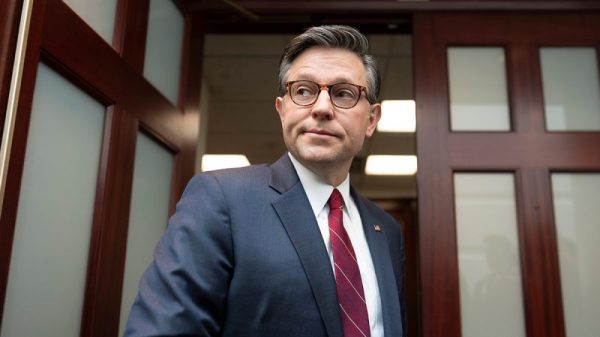The war in Gaza and a serious medical emergency suffered by the Marine Corps’ top officer have forced into the open months of simmering Republican frustration with Sen. Tommy Tuberville’s expansive hold on President Biden’s military nominees, driving several of his colleagues to publicly denounce the gambit and urge Senate leaders to take immediate action to end the impasse.
Concerns about Gen. Eric Smith’s apparent cardiac arrest on Sunday, coupled with fast-moving developments in the Middle East, have surfaced repeatedly this week as officials in Washington seek an off-ramp to the bitter political dispute between Tuberville (R-Ala.) and the Biden administration that centers on the Pentagon’s travel policy for troops seeking an abortion. Hundreds of senior military advancements have been stalled as a result, dating to February.
On Wednesday night, a remarkable scene unfolded on the Senate floor as several Republicans, including Sens. Dan Sullivan (Alaska), Joni Ernst (Iowa) Todd C. Young (Ind.) and Lindsey O. Graham (S.C.) confronted Tuberville, imploring him to lift his hold for the sake of national security and proposing votes on individual officers whose promotions have been delayed. Tuberville rebuffed them one by one, blocking each proposed nominee as his colleagues’ frustration continued to rise.
The confrontation stretched nearly five hours, with Ernst, a retired Army officer, and Sullivan, a colonel in the Marine Corps Reserve, rotating to bring forward the bulk of 61 officers presented by name. They called out Tuberville for saying previously that he would relent on nominations that were brought forward for votes individually.
“Xi Jinping is loving this. So is Putin,’ Sullivan said at one point, referring to top leaders in China and Russia. ‘How dumb can we be, man?”
Sullivan said that he has raised repeatedly with Tuberville an alternative plan in which he could put a hold on the nomination of Derek Chollet, a political appointee who has been nominated by Biden to serve as undersecretary of defense for policy, rather than nonpartisan military officers who have no role in the policy in question.
“The key is you put a hold on someone who typically has some kind of control over the issue you’re trying to fix,” Sullivan said. “Why are we putting holds on war heroes?”
Kelly Magsamen, chief of staff to Defense Secretary Lloyd Austin, made clear she was watching the clash, thanking the senators on X, the site formerly known as Twitter, for “taking a stand for our military and their families.” One of the nominees, Army Lt. Gen. Douglas Sims, works 18 hours per day, seven days per week, she said.
“The world is watching,” she added in another message. “This isn’t a game.”
The surprising public confrontation made clear that some of Tuberville’s Republican colleagues have hit their limit, but it remains unclear if there is enough GOP support for a Democratic plan to temporarily change Senate rules to neutralize his blockade. That proposal is set to come to a vote in the next few weeks, and would need nine Republicans to support it.
Some Republicans have urged Tuberville, who imposed his hold in protest of the Pentagon’s policy of reimbursing personnel who must travel out of state for reproductive care, to adjust tactics and focus instead on Biden’s proposed political appointments.
In a brief interview Wednesday, Tuberville said he has no intent to change course. “We’re not going to start backing up now just because people are starting to start to get cold feet … on my side” of the political aisle. He held firmly to this position as the evening’s theatrics wore on, declaring “I object” each time as his GOP colleagues, most with military backgrounds themselves, proposed an individual officer for a promotion.
At one point, Graham, his voice rising, said there’s a reason that no other senator had pursued a move like this for so long. “No matter whether you believe it or not, Senator Tuberville, this is doing great damage to our military,” he said. “I don’t say that lightly; I’ve been trying to work with you for nine months.”
Tuberville initiated the legislative blockade in February, preventing the Senate from using its typical process for approving uncontroversial nominees in batches of dozens or hundreds at a time. The number of military officers ensnared by the logjam has risen to 375 and includes positions spanning commands worldwide. The Pentagon estimates that by the end of the year, about three-quarters of the generals and admirals in the Defense Department — 650 of 852 — will be affected.
The Senate can bypass Tuberville’s hold by voting on officers individually, which it has done in only three instances, but to do so now for every frozen nomination would take months and impede action on numerous other issues.
Smith, 58, is the Marine Corps commandant and a member of the Joint Chiefs of Staff. He remains hospitalized in stable condition, the service said in a statement Wednesday. Officials have offered little publicly about his condition and prognosis, saying the general’s family has asked for privacy as he “continues his recovery” and that updates would be shared “as appropriate.”
Before the Senate approved his nomination in September, Smith was the service’s assistant commandant, a post that has remained vacant amid the ongoing gridlock. That has left him to shoulder the responsibilities of both jobs since July, when his predecessor retired. He had been among the most candid military officials about the challenges Tuberville’s hold created, saying the workload was not “sustainable.”
It is unclear how long Smith may be out of work. The issue is particularly complex given the long hours, high pressure and frequent travel associated with his job.
For now, with the No. 2 post empty and no other Marine Corps four-star generals at the Pentagon, Smith’s duties will fall to a subordinate general, Lt. Gen. Karsten Heckl, Marine officials said.
Senate Majority Leader Charles E. Schumer (D-N.Y.) told reporters Wednesday that he supports temporarily changing the Senate’s rules to bypass Tuberville’s blockade and allow senators to vote on a large block of military nominees. The resolution, backed by Sen. Jack Reed (D-R.I.), chairman of the Senate Armed Services Committee, and Sen. Kyrsten Sinema (I-Ariz.), would need all Democrats and nine Republican votes to pass.
“Patience is wearing thin with Senator Tuberville on both sides of the aisle,” Schumer said. “What happened with the Marine commandant just showed many people how dangerous” Tuberville’s gambit has proved. The majority leader said he is “very optimistic” that the resolution will pass once put to a vote, but when asked when that could happen, he responded: “We’ll see.”
On Tuesday, Senate Minority Leader Mitch McConnell (R-Ky.) said he believes the hold on military nominations is a “bad idea.”
“I have been among those trying to convince Sen. Tuberville to express his opposition some other way, by people who actually make policy as opposed to our military heroes,” McConnell said.
Republicans have offered Tuberville multiple off-ramps this year, but he has refused to go along, according to one Republican who, like others, spoke on the condition of anonymity to discuss internal matters.
During a private meeting of Senate Republicans on Wednesday, Smith’s unclear prognosis and the unpredictability of the war in Gaza both were raised as reasons that lawmakers must find a resolution soon, according to a Senate aide familiar with the discussion. Among the nominees on hold are the prospective next commander of the Navy’s 5th Fleet and the deputy commander of U.S. Central Command. Both positions have vital leadership functions in the Middle East, where U.S. troops have faced repeated attacks since the war between Israel and Gaza reignited in early October.
“The thought is that this is a really dangerous time, and not a time when we want a [junior varsity] squad of military officers” temporarily filling key posts, the aide said.
On Tuesday, Schumer filed a motion to force individual votes to fill key vacancies in the Joint Chiefs of Staff. Those nominees include Adm. Lisa Franchetti, Biden’s choice to lead the Navy; Gen. David W. Allvin, nominated to lead the Air Force; and Lt. Gen. Christopher J. Mahoney, who would be promoted to four-star general, become the Marine Corps’s No. 2 officer, and step in as the caretaker commandant in Smith’s absence.
Those could be held as soon as Thursday.
A spokesman for Tuberville, Steven Stafford, had indicated earlier that the senator would push for an individual vote for Mahoney, and Sullivan said he would press for votes on Allvin and Franchetti. Republicans have criticized Schumer for not bringing more of the blockaded officers forward for individual votes, and did so again Wednesday night.
Any vote to go around Tuberville’s hold on the hundreds of other frozen nominations is probably weeks away, as it still needs to go through the committee process. Many Republican senators have rejected the idea, however, saying they believe it could weaken lawmakers’ power to stall nominations in the future.
“I’m not for a rule change,” said Sen. John Cornyn (R-Tex.), “because I think we see around here that once precedent is set for a rule change then it’s a slippery slope to other changes, which I think threatens the institution.”
Sen. Lisa Murkowski (Alaska), a moderate Republican who Democrats often seek out for bipartisan efforts, said Wednesday that she, too, is “cautious” about any vote that overturns the Senate’s rules, even as she remains concerned about the impact of Tuberville’s hold.
The war in Gaza and a serious medical emergency suffered by the Marine Corps’ top officer have forced into the open months of simmering Republican frustration with Sen. Tommy Tuberville’s expansive hold on President Biden’s military nominees, driving several of his colleagues to publicly denounce the gambit and urge Senate leaders to take immediate action to end the impasse.
Concerns about Gen. Eric Smith’s apparent cardiac arrest on Sunday, coupled with fast-moving developments in the Middle East, have surfaced repeatedly this week as officials in Washington seek an off-ramp to the bitter political dispute between Tuberville (R-Ala.) and the Biden administration that centers on the Pentagon’s travel policy for troops seeking an abortion. Hundreds of senior military advancements have been stalled as a result, dating to February.
On Wednesday night, a remarkable scene unfolded on the Senate floor as several Republicans, including Sens. Dan Sullivan (Alaska), Joni Ernst (Iowa) Todd C. Young (Ind.) and Lindsey O. Graham (S.C.) confronted Tuberville, imploring him to lift his hold for the sake of national security and proposing votes on individual officers whose promotions have been delayed. Tuberville rebuffed them one by one, blocking each proposed nominee as his colleagues’ frustration continued to rise.
The confrontation stretched nearly five hours, with Ernst, a retired Army officer, and Sullivan, a colonel in the Marine Corps Reserve, rotating to bring forward the bulk of 61 officers presented by name. They called out Tuberville for saying previously that he would relent on nominations that were brought forward for votes individually.
“Xi Jinping is loving this. So is Putin,’ Sullivan said at one point, referring to top leaders in China and Russia. ‘How dumb can we be, man?”
Sullivan said that he has raised repeatedly with Tuberville an alternative plan in which he could put a hold on the nomination of Derek Chollet, a political appointee who has been nominated by Biden to serve as undersecretary of defense for policy, rather than nonpartisan military officers who have no role in the policy in question.
“The key is you put a hold on someone who typically has some kind of control over the issue you’re trying to fix,” Sullivan said. “Why are we putting holds on war heroes?”
Kelly Magsamen, chief of staff to Defense Secretary Lloyd Austin, made clear she was watching the clash, thanking the senators on X, the site formerly known as Twitter, for “taking a stand for our military and their families.” One of the nominees, Army Lt. Gen. Douglas Sims, works 18 hours per day, seven days per week, she said.
“The world is watching,” she added in another message. “This isn’t a game.”
The surprising public confrontation made clear that some of Tuberville’s Republican colleagues have hit their limit, but it remains unclear if there is enough GOP support for a Democratic plan to temporarily change Senate rules to neutralize his blockade. That proposal is set to come to a vote in the next few weeks, and would need nine Republicans to support it.
Some Republicans have urged Tuberville, who imposed his hold in protest of the Pentagon’s policy of reimbursing personnel who must travel out of state for reproductive care, to adjust tactics and focus instead on Biden’s proposed political appointments.
In a brief interview Wednesday, Tuberville said he has no intent to change course. “We’re not going to start backing up now just because people are starting to start to get cold feet … on my side” of the political aisle. He held firmly to this position as the evening’s theatrics wore on, declaring “I object” each time as his GOP colleagues, most with military backgrounds themselves, proposed an individual officer for a promotion.
At one point, Graham, his voice rising, said there’s a reason that no other senator had pursued a move like this for so long. “No matter whether you believe it or not, Senator Tuberville, this is doing great damage to our military,” he said. “I don’t say that lightly; I’ve been trying to work with you for nine months.”
Tuberville initiated the legislative blockade in February, preventing the Senate from using its typical process for approving uncontroversial nominees in batches of dozens or hundreds at a time. The number of military officers ensnared by the logjam has risen to 375 and includes positions spanning commands worldwide. The Pentagon estimates that by the end of the year, about three-quarters of the generals and admirals in the Defense Department — 650 of 852 — will be affected.
The Senate can bypass Tuberville’s hold by voting on officers individually, which it has done in only three instances, but to do so now for every frozen nomination would take months and impede action on numerous other issues.
Smith, 58, is the Marine Corps commandant and a member of the Joint Chiefs of Staff. He remains hospitalized in stable condition, the service said in a statement Wednesday. Officials have offered little publicly about his condition and prognosis, saying the general’s family has asked for privacy as he “continues his recovery” and that updates would be shared “as appropriate.”
Before the Senate approved his nomination in September, Smith was the service’s assistant commandant, a post that has remained vacant amid the ongoing gridlock. That has left him to shoulder the responsibilities of both jobs since July, when his predecessor retired. He had been among the most candid military officials about the challenges Tuberville’s hold created, saying the workload was not “sustainable.”
It is unclear how long Smith may be out of work. The issue is particularly complex given the long hours, high pressure and frequent travel associated with his job.
For now, with the No. 2 post empty and no other Marine Corps four-star generals at the Pentagon, Smith’s duties will fall to a subordinate general, Lt. Gen. Karsten Heckl, Marine officials said.
Senate Majority Leader Charles E. Schumer (D-N.Y.) told reporters Wednesday that he supports temporarily changing the Senate’s rules to bypass Tuberville’s blockade and allow senators to vote on a large block of military nominees. The resolution, backed by Sen. Jack Reed (D-R.I.), chairman of the Senate Armed Services Committee, and Sen. Kyrsten Sinema (I-Ariz.), would need all Democrats and nine Republican votes to pass.
“Patience is wearing thin with Senator Tuberville on both sides of the aisle,” Schumer said. “What happened with the Marine commandant just showed many people how dangerous” Tuberville’s gambit has proved. The majority leader said he is “very optimistic” that the resolution will pass once put to a vote, but when asked when that could happen, he responded: “We’ll see.”
On Tuesday, Senate Minority Leader Mitch McConnell (R-Ky.) said he believes the hold on military nominations is a “bad idea.”
“I have been among those trying to convince Sen. Tuberville to express his opposition some other way, by people who actually make policy as opposed to our military heroes,” McConnell said.
Republicans have offered Tuberville multiple off-ramps this year, but he has refused to go along, according to one Republican who, like others, spoke on the condition of anonymity to discuss internal matters.
During a private meeting of Senate Republicans on Wednesday, Smith’s unclear prognosis and the unpredictability of the war in Gaza both were raised as reasons that lawmakers must find a resolution soon, according to a Senate aide familiar with the discussion. Among the nominees on hold are the prospective next commander of the Navy’s 5th Fleet and the deputy commander of U.S. Central Command. Both positions have vital leadership functions in the Middle East, where U.S. troops have faced repeated attacks since the war between Israel and Gaza reignited in early October.
“The thought is that this is a really dangerous time, and not a time when we want a [junior varsity] squad of military officers” temporarily filling key posts, the aide said.
On Tuesday, Schumer filed a motion to force individual votes to fill key vacancies in the Joint Chiefs of Staff. Those nominees include Adm. Lisa Franchetti, Biden’s choice to lead the Navy; Gen. David W. Allvin, nominated to lead the Air Force; and Lt. Gen. Christopher J. Mahoney, who would be promoted to four-star general, become the Marine Corps’s No. 2 officer, and step in as the caretaker commandant in Smith’s absence.
Those could be held as soon as Thursday.
A spokesman for Tuberville, Steven Stafford, had indicated earlier that the senator would push for an individual vote for Mahoney, and Sullivan said he would press for votes on Allvin and Franchetti. Republicans have criticized Schumer for not bringing more of the blockaded officers forward for individual votes, and did so again Wednesday night.
Any vote to go around Tuberville’s hold on the hundreds of other frozen nominations is probably weeks away, as it still needs to go through the committee process. Many Republican senators have rejected the idea, however, saying they believe it could weaken lawmakers’ power to stall nominations in the future.
“I’m not for a rule change,” said Sen. John Cornyn (R-Tex.), “because I think we see around here that once precedent is set for a rule change then it’s a slippery slope to other changes, which I think threatens the institution.”
Sen. Lisa Murkowski (Alaska), a moderate Republican who Democrats often seek out for bipartisan efforts, said Wednesday that she, too, is “cautious” about any vote that overturns the Senate’s rules, even as she remains concerned about the impact of Tuberville’s hold.





















